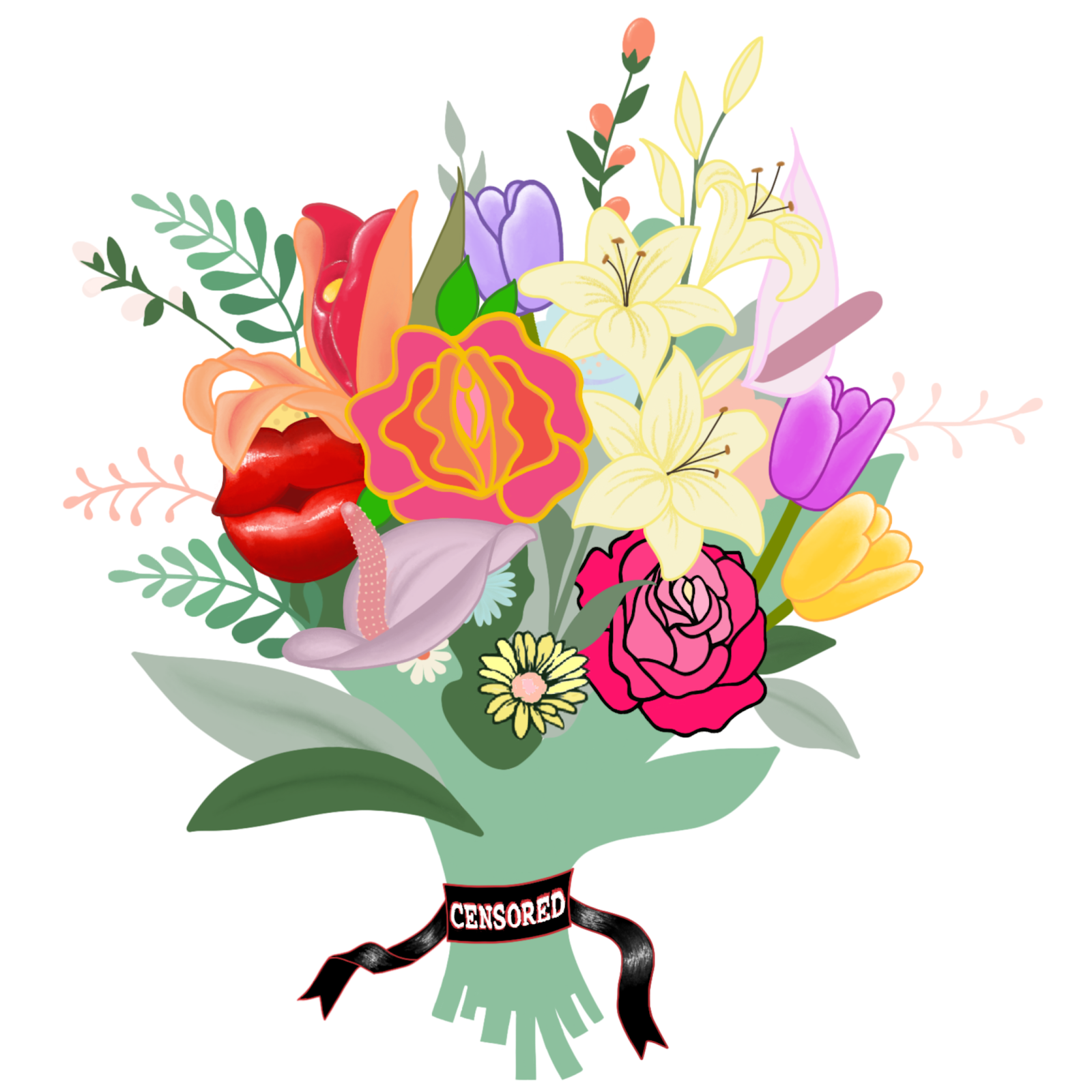Let’s Talk About Sex: Touch-a, Touch-a, Touch-a, Touch Myself
From behind locked doors to the top of the music charts, has female masturbation finally shaken the stigma?
In Let’s Talk About Sex, writers talk about sex. And music.
Written by Heather Stewart
Illustrated by Brittany Canales
Masturbation has always been a hazy topic for women. In fact, Victorian doctors believed that masturbation could eventually kill you. Today, some are overwhelmed by the shameful societal stigma surrounding female pleasure, while others feel empowered by sexual self-satisfaction. According to a global survey conducted by Womanizer, 72% of women have masturbated at least once. It’s only natural, then, that popular music is spotted with references to flicking the bean. While songs about the art of self-pleasure by women have become more mainstream, this erotic expression of self-love doesn’t come free of backlash.
Just because the documented history of women and masturbation is sparse doesn’t necessarily mean it's a new phenomenon. In a 1662 edition of Directory for Midwives, it is noted that the hymen “is not to be found in all Virgins, because some are very lustful, and when it itcheth, they put in their finger or some other thing, and break the membrane.” Since this was published, research has emerged regarding the destigmatization, benefits, and commonality of female masturbation. Yes, women masturbate. Yes, it can be good for you. Whether it’s releasing endorphins, reducing period cramps, or learning how you like to feel pleasure, masturbation has plenty of benefits.
While current scientific research aligns with the sexual liberation movement and public opinion is no longer that masturbation leads to neurosis, it still has a sinful connotation within certain religious sects such as Christianity and catholicism. The moral debate surrounding masturbation is still the hot topic of many Christian teen church group talks (mainly for boys since female masturbation is not normalized). With a veil of shame, masturbation is treated as a dirty little secret in many religious spaces. There’s even religious resources such as The Purity Coach that use music as a tool for fighting sexual temptation rather than a tool for sexual liberation.
This religious view on masturbation is what makes 1994’s “Icicle” by Tori Amos so controversial. The ‘90s alternative darling uses biblical allusions, titillating piano, and eerie, hymn-like operatic vocals to tell an abstract story of self-satisfaction in reference to the Christian faith. According to an interview with VOX in 1994, the preacher’s daughter was raised Methodist and had a huge crush on Jesus. These X-rated Christ fantasies come to life in “Icicle,” as Amos scandalously parodies the Last Supper, lamenting, “And when they say take of his body / I think I’ll take from mine instead / Getting off / Getting off / While they’re all downstairs / Singing prayers.” By paying homage to her disapproved teen fantasies of being Jesus’ lover, Amos explicitly rebels against the purity culture that she was raised in. “Icicle” paints a picture of the obvious tension between two camps: those who believe that masturbation is religious blasphemy and those who think it’s healthy.
Photo courtesy of Rolling Stone
Despite the religious connotations of masturbation, women have continued to grow more liberated through the years. In 1983, during America’s sexual revolution, Cyndi Lauper paired subtle visual and lyrical references to create one of the first universally recognized tracks about masturbation sung by a woman. With its reverberating rhythm and twinkling electronic synth, “She Bop” is the epitome of an ‘80s dance radio hit. Sexual easter eggs are hidden throughout the groovy track and its accompanying quirky music video. Lauper pairs a breathy opening sequence with visuals of her flailing around a car with legs wide open and a male erotica magazine, Beefcake, in hand, immediately hinting at “She Bop’s” deeper meaning. Following a cheeky cartoon chase that ends, unsurprisingly, at a “self-service” (*wink wink*) gas station, Lauper tauntingly sings while on trial: “They say I better get a chaperone / Because I can’t stop messin’ with the danger zone / Hey, hey I won’t worry and I won’t fret / Ain’t no law against it yet.” Despite the judge’s disapproval, Lauper breaks free and bops to freedom, alluding to her disregard for societal rules to chase joy in sexual liberation.
“She Bop” experienced ample success in the music charts, so it wasn’t surprising that people picked up on the track’s sexual subject matter. Lauper originally intended for a double meaning, so the commentary didn’t necessarily catch her by surprise. “I kept saying, ‘Look, I don’t wanna mention anything to do with hands,’” Lauper told VICE in a 2016 interview. “I want little kids to think it’s about dance and grown-ups to have a chuckle when they hear it.” But not everyone had such a lighthearted reaction to the song. Despite her Disney-clean attempt at double meanings, “She Bop”' endured public ridicule and even ended up on the Parents Music Resource Center’s “Filthy Fifteen” list. Although whether or not the song was appropriate for all ages was debatable, this wasn’t the only suggestive song to top the charts during this era. ‘90s music artists like the Divinyls and the Lunachicks also fought the stigma that sex, specifically for women, can’t be a solo act or completely for a woman’s pleasure. Both artists included references to masturbation on some of their tracks, including “I Touch Myself” and “Cumming into My Own.”
This phenomenon of women singing about self-pleasure hasn’t died down. In fact, the transparency of sexuality in women’s music has grown as time has passed. Despite the wicked connotations that some people associate with masturbation, it hasn’t kept women from singing about their self-endeavours. In some cases, the lyrics have only gotten more explicit. The 2000s music charts were littered with sultry narratives like that of Britney Spears’ “Touch of my Hand,” Tweety and Missy Elliot’s “Oops (Oh My),” and P!nk’s “Fingers.” A popular theme in feminist music during this time was the idea of not needing a man to take care of you or protect you, even for sexual satisfaction. Tracks like “Vibe On” by Dannii Minogue and “Toyz” by Missy Elliot took it one step further and celebrated replacing men with toys — sex toys. 2003’s “Toyz” opens with sexual moans and an iconically blunt opening line: “Whatchu mean I don’t need you no more? / ‘Cause I don’t! / I gotta bag full of toys and I don’t need none of your boys.” The repetitive groovy backtrack playfully supports the repetitive chorus and verses, but Elliot revives the explicit R&B track by closing on a similarly sassy (and once again, iconic) note:
“How could I miss you baby, I didn't even know you was gone
It's obvious you aren't needed in the bedroom anymore
I'm just keeping myself occupied like all women do when they are taking a bath
And when you leave, make sure you don't slam the door because you f-ck up my concentration”
Elliot paints an explicit picture of her kicking out a man in order to pleasure herself. Her comedically obvious approach is a testament to how much more comfortable women were becoming with their sexual independence during this time. This goes hand-in-hand with women’s growing economic independence during this decade. According to the Population Reference Bureau, 61% of adult women were in the labor force by the year 2000. Hey, someone’s gotta pay for the sex toys!
Today, women in the music industry are still singing about their self-pleasures. Pop tracks like “Dancin’ in Circles” by Lady Gaga, “Motherlove” by Bea Miller, and “Party for One” by Carly Rae Jepsen are the perfect soundtrack to your next solo candlelit bath. Self-love and independence are at the forefront of this generation’s sex lives, and the youth are making it known. 2016’s upbeat “Love Myself” by Hailee Steinfeld is the perfect example of this growing phenomenon. Over a syncopated beat and cheery bells, Steinfeld declares, “Know how to satisfy, keepin’ that tempo right / Without you / Pictures in my mind on replay / I’m gonna touch the pain away / I know how to scream my own name.” As the music escalates into a tense, climaxing chorus, Steinfeld belts out declarations of loving herself without needing any outside satisfaction (sexually or otherwise). While Steinfeld appreciates the sexual undertones of “Love Myself,” she emphasizes the self-love aspect of the track. “The beauty in the song is knowing that there is a double meaning, or triple meaning, or however many ways people interpret it.” Steinfeld told TIME. “For me, it’s ultimately about taking care of and indulging yourself. It’s a message that’s very easy to forget and nice to be reminded of.”
These women’s modern lyrical references to masturbation take on a new level of feminism by prioritizing self-care and unconditional confidence contrary to society’s beauty standards and expectations. Now that more women are able to pursue their dream careers, relaxation and indulgence are the new currencies of self-love, whether that’s achieved with the big O or a luxurious nap.
Women’s sexual liberation was born to normalize that women are sexual beings, just like people of all genders. Every woman is free to choose what feels sexually right for her. The wide array of female musicians who have sung about their personal experiences with masturbation has encouraged women to be in control of the conversations regarding female sexuality within pop culture. She bop, he bop, we bop. Or don’t — that’s okay too Regardless, women are free to be their own creature of the night.


